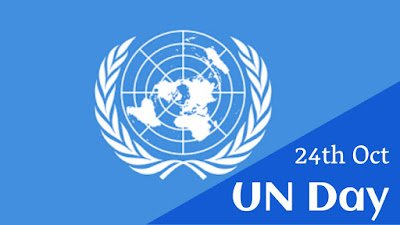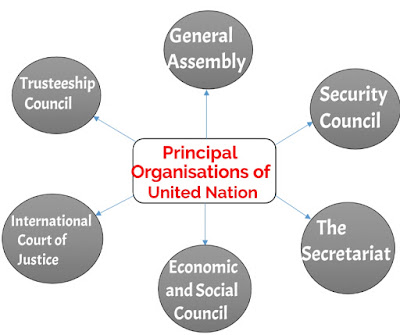Table of Contents
Important Points to Remember
1.) The theme for the UN Day 2018 is ‘Traditions of Peace and Non-Violence’.
2.) Secretary-General António Guterres attributed United Nations Day 2018 celebrations to mark the birthday of its founding Charter – the landmark document that embodies the hopes, dreams, and aspirations of “we the peoples”
3.) UN Day 2018 will also witness a Concert this year in the United Nations General Assembly Hall, New York on 24 October 2018. This event will be featuring sarod virtuoso Ustad Amjad Ali Khan, along with his sons Amaan Ali Bangash and Ayaan Ali Bangash.
Organisation Overview
Role of the United Nations
The United Nations was eastablished in 1945, following the devastation of the Second World War, with one central mission : the maintenance of international peace and security. It is then considered to be the modified version of the League of Nations. Initially, it was started with 51 member states and presently has a total of 193 member states. United Nations headquarters is mainly situated in Manhattan, New York, while its regional offices are in Geneva, Vienna, Nairobi. The main aim behind forming such an organization is to maintain the peace and the security and also to develop friendly relations among member nations. Furthermore, its objective is to achieve worldwide cooperation in solving International Economic, Social, Cultural and Humanitarian problems and to promote Human Rights.
Facts to know about United Nation
Secretary-General: Antonio Guterres.
Headquarters : New York, United States.
The first time United Nations Day was observed on – October 24, 1948
Number of official languages in United Nations – 6
Tenure of President of the UN General Assembly – 1 year
Number of member countries did the UNO have on its formation in 1945 – 51
Tenure of the UN Secretary General – 5 years
Tenure of a non-permanent member of the Security Council – 2 years
Number of non-permanent members in the Security Council – 10
The year in which the UNO was awarded the Nobel Peace Prize – 2001
Time for which General Assembly of UN meets in a regular session – Once a year
Number of member countries in UNO at present (as of Jan 2016) – 193
Principal Organisation of the United Nations
1.) General Assembly
• The General Assembly represents all the members of United Nations.
• The main purpose of the General Assembly is to discuss the trending issues and make recommendations related to matters which are stated in the UN charter.
• A decision on the admission of the new member states is also one of the most important functions of the General Assembly.
• Each member has only one vote. Thus, at the time of voting, minimum 2/3rd members are required.
• It also gives consent on budgetary matters but its resolutions are not binding on the members.
2.) The Security Council
• The basic objective behind establishing a Security Council was to maintain the international peace and security.
• It consists of 15 members: 5 permanent members and 10 non-permanent members. 5 permanent members include China, France, Russia, the United Kingdom, and the United States. The non-permanent members of the Security Council are elected for a period of 2 years.
• The five permanent members holds the veto power over the UN Resolutions Security Council, the most powerful organ of the United Nations.
• Unlike other organisations, SC have the power to make binding decision on any matter which has to be followed by some other member states.
3.) The Economic and Social Council
• This organisation was set up for discussing the International Economic and Social Issues.
• It coordinates and directs the Economic and the Social Activities of the UN and its specialized agencies.
• Total 54 members are their in the ECOSOC which are elected by the General Assembly for a period of 3 years.
4.) The International Court of Justice
• ICJ, also popularly known as World Court, was set up to settle international disputes across the globe.
• The Headquarters of ICJ is located in The Hague, Netherlands.
• It is the judicial organisation of the United Nations. The court consists of 15 judges who are appointed by the General Assembly for a period of 9 years.
• As per rules, no two judges should be from the same country. These Court’s decision are binding on the member nations.
5.) The Secretariat
• This organisation is the administrative body of the United Nations.
• It serves as the Chief administrative officer at all the meetings of UN. It also oversees the preparation of UN’s Budget.
• The secretariat is headed by the secretary general of UN. It also carries out the tasks as directed by the Security Council, the General Assembly, the Economic and Social Council, and other UN bodies.
• At present, the Secretary-General of UN is António Guterres who has succeeded ban Ki-moon in the year 2017.
6.) The Trusteeship Council
• This organisation was set up inorder to supervise the government of trust territories and in leading them to self-government or independence.
Noble Prize won by United Nations
Since its foundation, the United Nations along with the agencies and the officials has won a number of Nobel Peace Prizes in recognition of their work.
• Secretary-General, Dag Hammarskjold in 1961 and Kofi Annan in 2001 were awarded with the prestigious Nobel Peace Prize. A UN negotiator, René Cassin in 1968, won the prize for his contribution to the Universal Declaration of Human Rights. The US Secretary of State Cordell Hull was awarded the Nobel Peace Prize for his role in the foundation of the organization. B. Pearson, the Canadian Secretary of State for External Affairs, was awarded the Nobel Peace prize in 1957 for his role in organizing the UN’s first Peacekeeping force for resolving the Suez Crisis.
• UN specialized agency UNICEF won the Noble Prize in 1965, the International Labour Organization in 1969, the UN Peacekeeping Forces in 1988, the International Atomic Energy Agency (which reports to the UN) in 2005, and the UN-supported Organization for the Prohibition of Chemical Weapons in 2013 won this prestigious prize for their tremendous efforts in their respective field. The UN High Commissioner for Refugees was also awarded twice in 1954 and 1981. The United Nation as a whole was awarded the prize in 2001, along with Mr. Annan.
That’s all in this article, feel free to comment below if you found it useful. Keep Sharing and Happy Learning.
Thank You!!












